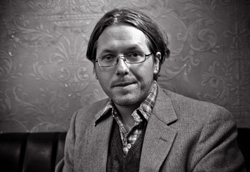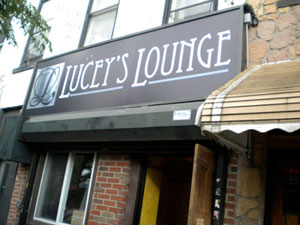

By Jay Fox
Brooklyn, NY, USA
"Any wonder we tried gin" — Philip Levine
Working two jobs sucks. A lot of people have found this out recently on account of the economy. Whether it’s due to the fact that they aren’t getting the raise they anticipated, the burden of debt or due to the lack of a single full-time job, they’re seeking out a second source of revenue. The hours are bad, the pay is mediocre and social relations suffer. Yes, it is more money, but, as I’ve found out, even more money has a cost.

Jay Fox
While one can’t help but feel less than enthusiastic about having to take on a second job, the plus, of course, is that work can be found here in New York. This is very different than my home state of Michigan, which is perhaps the nation’s chief exporter of young, college-educated people, who leave because they can’t find one shitty job, let alone two decent ones.
Michigan is the poster child for the havoc caused by the switch from an industrial economy to an economy that must rely on construction, services (finance, banking, health care, etc.) and the creation of intellectual content in order to thrive. As Michigan is depopulating, construction isn’t doing so well. Since most services (unless one counts buying their necessities at the local Kroger or Meijer) occur in places like Chicago or New York, the service industry can’t enjoy a renaissance. Due to the fact that consumers don’t want to pay for intellectual content because…well, consumers don’t want to pay for anything, you can have all of the artists you could ever want (or need) in a city like Detroit, but that won’t create an economy; it will just serve as a stopover for kids who want to be artists, who will stay if they make it, but will leave if they don’t, and head for a city that can offer a substantial paycheck to ameliorate their crushing debt, which is what is currently going on. Until you have people creating jobs, nothing will revitalize that city. Yes, I still love Detroit, but I’m a realist. Thirty good bars and a host of well-intentioned grad students and artists won’t sustain a modern economy. These are elements of a nice neighborhood, not of a thriving city.
This is why people leave places like Detroit. This is why so many of the young, hip kids that I meet out in the bars in Brooklyn aren’t from here. While I may meet a few people from California or Phoenix, the majority of this non-native demographic is from the Rust Belt, that part of the country that has had it the worst since industry started the long process of emigration back in the late 70s and accelerated during the scourge of Reaganomics. Conservatives will blame unions, but, if you look at the basic mathematics, it’s less about organized labor and the higher wages those whom they represent demand, and more about the fact that transportation costs have dropped to such an extent that, in the eyes of a business owner, it makes sense to manufacture a lot of products in foreign countries where labor is cheap, environmental regulations are virtually nonexistent and the bosses can do more than just proverbially screw the workforce with total impunity. Capitalism is an economic system, not an ethical system. The categorical imperatives of this system concern bottom lines and profit, and have proven to be far more international in scope, and perhaps even more destructive, than Communism ever managed to be.
The point is that Detroit and the rest of the Rust Belt can’t compete with poorer countries when it comes to manufacturing easily transportable commodities. For this reason, and perhaps a good number more, places like Detroit will continue to suffer, and people like myself will continue to move to cities like New York, Chicago, L.A., San Francisco and so on. As Philip Levine—the current Poet Laureate of the US and voice of proletariat Detroit—has pointed out, on the subject of Detroit, it’s not getting better. For a man who owes his career to the city, this means a lot. It also means a lot when you read that Levine currently spends his days in Fresno, where he taught for several decades, and (where else?) Brooklyn.

Lucey's Lounge, Gowanus
Though Levine’s case harkens back to a different generation, the prospects for those of us in Generation Y have gotten worse. This is something that I’ve been witnessing since I moved here in 2001, and something that I’ve understood for just about as long. It’s not getting better. And since the majority of us in the world lack either the capital or the knowhow to create our own jobs, let alone a company that will supply others with work, we have to find a place that will pay us to work. Younger people in the Rust Belt recognize this. Some of them simply move here directly after high school. The majority of individuals, though, go to college, look at the job markets in New York and back home, and then make the most rational financial decision to immigrate to the big city. The problem, of course, is that some of them don’t get the job they hoped for, and they end up tending bar at places like Lucey’s Lounge (475 3rd Avenue), a new cocktail joint in the southern portion of Gowanus.
The part of Gowanus that Lucey’s moved into used to be one of the most desolate parts of Brooklyn. Even a few years ago it was filled with light industry, a few houses and not much else. Stray animals used to outnumber people on the street after dark, and the only beacon of light was the Duncan Donuts down on 14th Street and 3rd Ave. It was a bit like parts of Detroit. So it was kind of weird to stumble upon a place like Lucey’s, which has taken over a space that was probably a store or restaurant during the 40s, but, in the recent past, was someone’s apartment. Even stranger was the drink menu, which evinced that it was one of the most recent additions to the long list of bars seeking to reestablish the lost art of making a perfect cocktail. The difference between Lucey’s and most of these other places—I can’t really qualify them with the universal ‘all’ because I can’t afford to drink in more than a few of them—is the other lack of pretention from the bar staff and the completely reasonable prices of their concoctions. Whoever opened the bar knew that the clientele was not going to stand for $14 cocktails no matter how obscure the ingredients may be, and, consequently, has made a very fine selection of drinks that may be kind of expensive, but are certainly not unreasonable.
The décor, meanwhile, is something of a bizarre hybrid of a speakeasy and a fin de siècle drawing room, these two seemingly paradoxical options being separated by a curtain that looks like a snapshot of a lava lamp (kind of like a visual representation of a really good Yes song—something off of Close to the Edge or Fragile). It’s bizarre, but somehow fitting. Like the location of the bar, which is literally a stone’s throw away from the elevated F and G trains as they travel between the Smith and 9th and 4th Avenue stops, it makes sense once you’re inside.
My girlfriend and I ended up at Lucey’s one night that was by then technically morning, though the sun was still tucked a good three hours beneath the horizon. I had finished my second shift for the day and we had just been politely asked to not have an after dinner drink at the place we had just eaten, as the kitchen had closed and the bar was in the process of getting stripped down. It was not late for New York, though late for just about anywhere else in the country, and, as the two of us have been in this city for perhaps too long, we decided that it was a crime to go home sober, especially after one of us had had a fourteen hour day and for once it wasn’t her. Lucey’s appeared out of nowhere as we were discussing our options, and without much in terms of decision making or head nodding or other signals we walked in. The space was still redolent with the smell of wet paint and the bartenders still green on the intricacies of the house specials as the place had only been open a short time, but the atmosphere was welcoming.
What we found inside was a few recent additions to the neighborhood attempting to become regulars. We quickly made friends with the bartender, who was from Brooklyn (Michigan), as well as the soon-to-be barback, who was from somewhere upstate nearby Albany and a relation of the owner. The two had come here for the same reasons I articulated above: There was nothing for them to do in their hometowns—no prospects, not even the old bummer of having to work the same job their fathers’ once did, as these jobs had moved on to greener pastures, while they, the workers, had been left behind. They had not moved to New York to become the next Warhol or Capote, though there certainly are people who still do. The difference now, however, is that, with a globalized world that is does not require an individual be in New York or Paris or Rome to become an international sensation, they could have done this without moving, provided, that there had been a day job that could have paid for rent and food as they perfected their preferred medium.
Perhaps what’s so interesting about these types of bars is not simply the fact that mixology is popular again, but that incredibly talented people are beginning to fill posts that were once considered to be transient positions, places for people who were between jobs or hoping to become famous musicians, artists, poets, writers, actors, etc, and didn’t really care about the drinks they made. They are still the struggling artists, but the new breed of bartender, so often from the Rust Belt, seems to be more astute when it comes to cocktails, to talking seriously about beer, to making recommendations that are not comprised of vodka and juice. There’s an artistic sensibility there, an appreciation and understanding of the tools of the trade.
Bartenders are no longer expected just to pour beers and glasses of wine, to stir martinis and shake manhattans. They create new drinks featuring new and often weird types of booze (such as gin that has been aged in oak barrels and consequently tastes a bit like mescal). Furthermore, the majority of bartenders that I meet who take serious amounts of pride in their abilities may still be artists, but they are not from New York or California; they are from Albany, Buffalo, Cleveland, or, in the case of the bartender at Lucey’s, Brooklyn, Michigan. They take pride in what they do because they take pride in their work, even if that work is getting people shitfaced. This sense of pride and originality is really what it means to be an artist—or, at the very least, an artisan. Seeing such people behind the bar reminds me of how integral people like this are to the city, as well as how ambition is so often mutated by necessity. With the freedom afforded to them by the owners, as well as they’re own intuition and skill, you’ll find that the bartenders at places like Lucey’s are the ones who know how to make the best manhattans.
Link:
Jay Fox's Profile at Stay Thirsty Publishing





